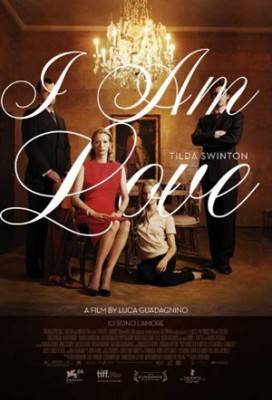 I’m afraid that I don’t have much to say that is profound, or even very thoughtful, about Luca Guadagnino’s I Am Love. It’s not a film that I can say I particularly liked. But I didn’t dislike it either. What I think happened on Saturday night is that I got so caught up in the glorious cinematography of the film, that I neglected to pay much attention to anything else.
I’m afraid that I don’t have much to say that is profound, or even very thoughtful, about Luca Guadagnino’s I Am Love. It’s not a film that I can say I particularly liked. But I didn’t dislike it either. What I think happened on Saturday night is that I got so caught up in the glorious cinematography of the film, that I neglected to pay much attention to anything else.
I Am Love is a story about a woman, Emma, and her aristocratic family in Milan. The family’s patriarch has announced that he is retiring, and he’s dictated that the responsibility of their textile business will now be shared by his son, Tancredi, and his grandson, Edoardo.
Emma and Tancredi enjoy an amicable marriage, but our first glimpse of them alone together in their bedroom shows us that, though their relationship is harmonious, it is lacking in love and passion. And later, during the party, Emma’s strained, edgy twisting of a ribbon shows us that she is not happy either, even when surrounded by her family.
Emma is lonely and, as a Russian who married into this great Italian family, she is accepted and even loved, but she still feels “apart.” Then, an accidental discovery that her daughter, Betta, is lesbian and has found love (however unsuitable) inspires Emma to reevaluate her own choices and to seek love and happiness for herself (however unsuitable).
And where does Emma find love? She finds it in Antonio, her son’s best friend. What begins as an incredibly selfish ― though completely natural ― decision to have an affair with a handsome, talented chef (who is her son’s best friend), leads to deep, enduring love. Unfortunately, this love is illustrated through clichéd symbolism of flowers being fertilized by insects, while Emma and Antonio make love in the gorgeous, lush fields. My sarcasm aside, the scenery ― both flora and fauna ― is magnificent.
Naturally, this affair leads to tragedy. How could it not? The woman is sleeping with her son’s best friend. And I think that Emma knew all along that this would not end well, but it was worth it to her. Every decision that Emma makes following this affair is about her happiness and hers alone. And in the end, she gets everything that she wants.
I Am Love is a gorgeous film to watch. I don’t think I could invoke enough adjectives to adequately describe it, but panelist Kartina Richardson said it best when she used the word “grandeur.” The beauty, of course, does not just come from the Italian countryside, but also from Milan’s architecture. The impeccable fashion, the exquisite artistry with which food is displayed and served (and eaten), and the beautiful actors themselves (no “normal looking” human beings were cast in this film, not even among the servants) all add to a glorious visual orgy in which I could not help but get lost.

Another reason the film is gorgeous to watch is due to the acting. It goes without saying that Tilda Swinton is sublime. But Maria Paiato (Ida), Edoardo Gabbriellini (Antonio), and especially Flavio Parenti (Edoardo) are fantastic as well. I won’t be tedious and list all of the actors, but all of them are very good and bring much talent to the film.
Unfortunately, I found the film’s score to be far too melodramatic; however ― from the remarks by Swinton and the panel, as well as the audience’s reaction ― I think I’m alone in this. What I found far more compelling, though, were the silent moments in the film: Tancredi helping Emma put on her shoes and placing his jacket over her shoulders contrasted with Antonio removing her shoes and eventually all of her clothes. These brilliant, symbolic moments weren’t lost on me, because they spoke louder than any musical score (or dialogue, for that matter) could.
See I Am Love based on its talented cast and its visual beauty alone. And who knows? You may also enjoy the story and the music. Then, you can come back here and call me a troglodyte who wouldn’t know a brilliant film if it was presented to me by Roger Ebert himself.
Movie stills taken from Ebertfest.com.
Please see Jamie Newell’s gorgeous photos here.








